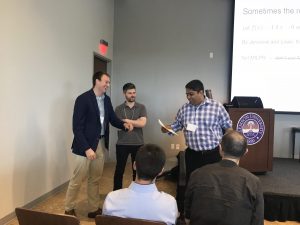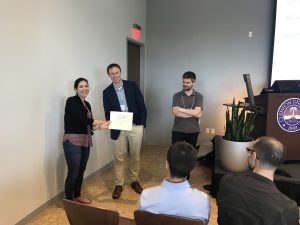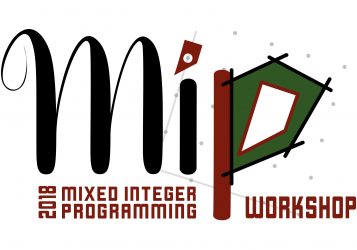Poster Awards
- Winner: Asteroide Santana (Georgia Tech) (collected by Santanu Dey)

- Honorable Mentions:
Sriram Sankaranarayanan (Johns Hopkins), Sahar Tahernejad (Lehigh)


Posters based on accepted extended abstracts (in alphabetical order):
- Beste Basciftci (Georgia Tech): Data-driven generator maintenance and operations scheduling under decision-dependent uncertainty
- Tim Holzmann (Clemson): A modified augmented weighted Tchebychev norm for multi-objective combinatorial optimization
- Ben Knueven (Tennessee): Tight generator schedules and unit commitment
- Sascha Kuhnke (RWTH Aachen): An adaptive discretization algorithm for the design of water usage and treatment networks
- Dabeen Lee (Carnegie Mellon): Generalized Chvatal-Gomory closures for integer programs with bounds on variables
- Haochen Luo (Texas A&M): N-step cutset inequalities: facets for multi-module capacitated network design problem
- Ali Irfan Mahmutogullari (Bilkent): The value of multi-stage stochastic programming in risk-averse unit commitment problems
- Joshua Margolis (Clemson): A mixed-integer model for the volumetric modulated arc therapy treatment planning problem
- Hamid Nazari (Clemson): Integer programming for equilibrium pricing
- Prashant Palkar (IIT Bombay): Mixed-Integer Derivative-Free Optimization
- Sriram Sankaranarayanan (Johns Hopkins): Can cut generating functions be good and efficient?
- Asteroide Santana (Georgia Tech): New SOCP relaxation and branching rule for bipartite bilinear programs
- Thiago Serra (Carnegie Mellon): Bounding and counting linear regions of deep neural networks
- Meenarli Sharma (IIT Bombay): Automatic reformulation techniques for mixed-integer nonlinear programs
- Sahar Tahernejad (Lehigh): Valid inequalities for mixed integer bilevel linear optimization problems
- Alfredo Torrico (Georgia Tech): Submodular maximization under matroid constraints: a case for robustness
- Eli Towle (Wisconsin-Madison): External intersection cuts
- Hamidreza Validi (Oklahoma State): A note on “A linear-size zero-one programming model for the minimum spanning tree problem in planar graphs”
- Guanyi Wang (Georgia Tech): Computational evaluation of new dual bounding techniques for sparse PCA
- Jiawei Wang (UC Davis): Characterization and approximation of strong general dual-feasible functions
- Site Wang (Clemson): POD.jl: a global MINLP solver based on adaptive piecewise linear relaxations
- Zeyang Wu (Minnesota): Optimal sequencing for a pair of square matrices
- Jie Zhang (Virginia Tech): Multi-product newsvendor problem with substitutions: a stochastic integer program perspective
- Xuan Zhang (Columbia): Legal assignments, the EADAM algorithm, and Latin marriages
- Yingqiu Zhang (Virginia Tech): Two-stage stochastic p-order conic mixed-integer programs: tight second-stage formulation
- Haoran Zhu (Wisconsin-Madison): Relaxations for linear programs with complementarity constraints
Information for Poster Presenters:
- Send all emails to mip2018poster@gmail.com.
- The size of the poster display board is 36″ tall x 48″ wide, so your poster should not exceed this size.
- We recommend printing posters at your home institution where you may avail discounted pricing. If this is not possible, printing centers, such as UPS, Fedex, etc. near the conference venue may be found through search engines.
- Email by June 7th an abstract of your poster (max. 1 page) using the template emailed to you. This will be included in the conference booklet.
- Email by June 14th a single slide (without clicks) in PDF that you will use to briefly introduce your poster in one of the “Poster Teaser” sessions on the first day. (Use “Advertisement Slide – YourName” as the subject of the email). A strict one-minute time limit will be enforced for each introduction.
- Email your poster as a PDF file, so that it can be posted to this website. If you are a graduate student or postdoc, and wish to be considered for the Best Poster Award, then you must email this file June 16th and indicate you wish to be considered for the award.
